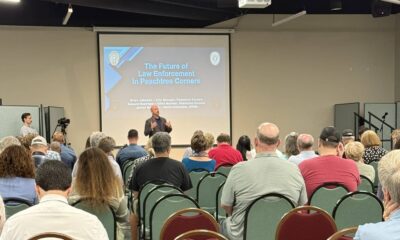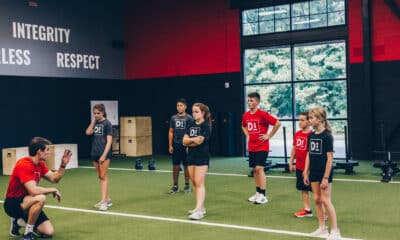Business
The Impact of COVID-19 on the Future of the Restaurant Business
Published
5 years agoon
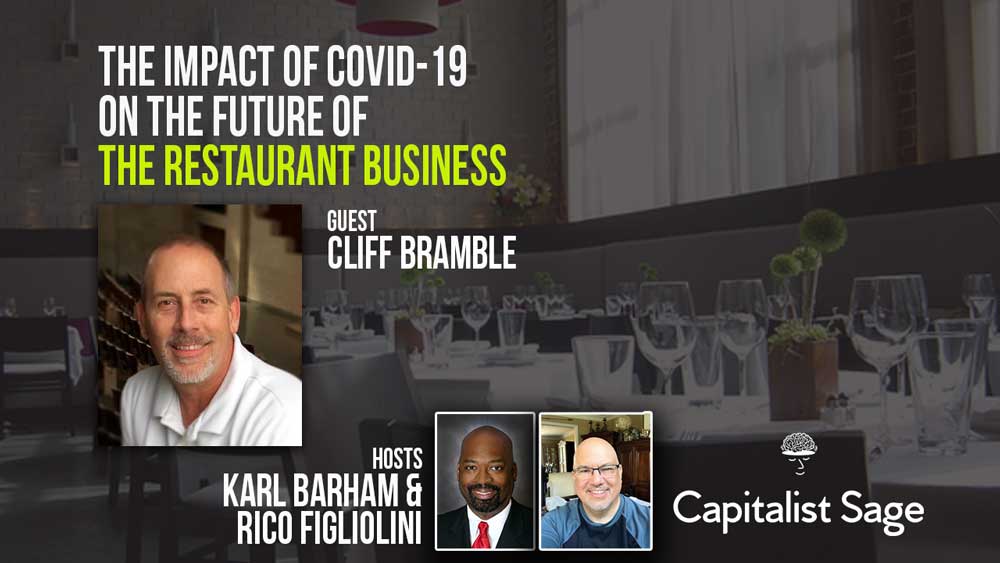
Clifford Bramble, author of “Within Our Walls” an “inspirational story for the restaurant industry,” and the founder and owner of Hungry Hospitality joins Karl Barham and Rico Figliolini to talk about the current state and the future of the restaurant business. Recorded socially safe from the City of Peachtree Corners, Georgia
Website: https://www.hungryhospitality.com
Social Media: @HungryHospitality
“No matter what industry you’re in, you have to learn and do the job before you actually become an owner of the job. Or the owner of the business. So if somebody wants to get into the chef position, they have to learn how to cook. If somebody wants to learn how to do the business side, they have to learn the front of the house stuff. So it’s really important that they still have to be working for somebody to learn from somebody. They can do it in school, but they’re going to learn a lot more on property, inside a restaurant.”
CLiff Bramble
Where to find the topic, timestamp:
[00:00:30] – Intro
[00:01:49] – About Cliff
[00:03:35] – Why Restaurants?
[00:07:22] – First impressions of COVID
[00:09:19] – Doing Things Differently
[00:14:07] – Finding the Right Information
[00:17:52] – Reopening
[00:18:57] – Looking to the Future
[00:25:21] – Restaurant Real Estate
[00:29:20] – Getting into the Restaurant Business
[00:31:12] – Closing
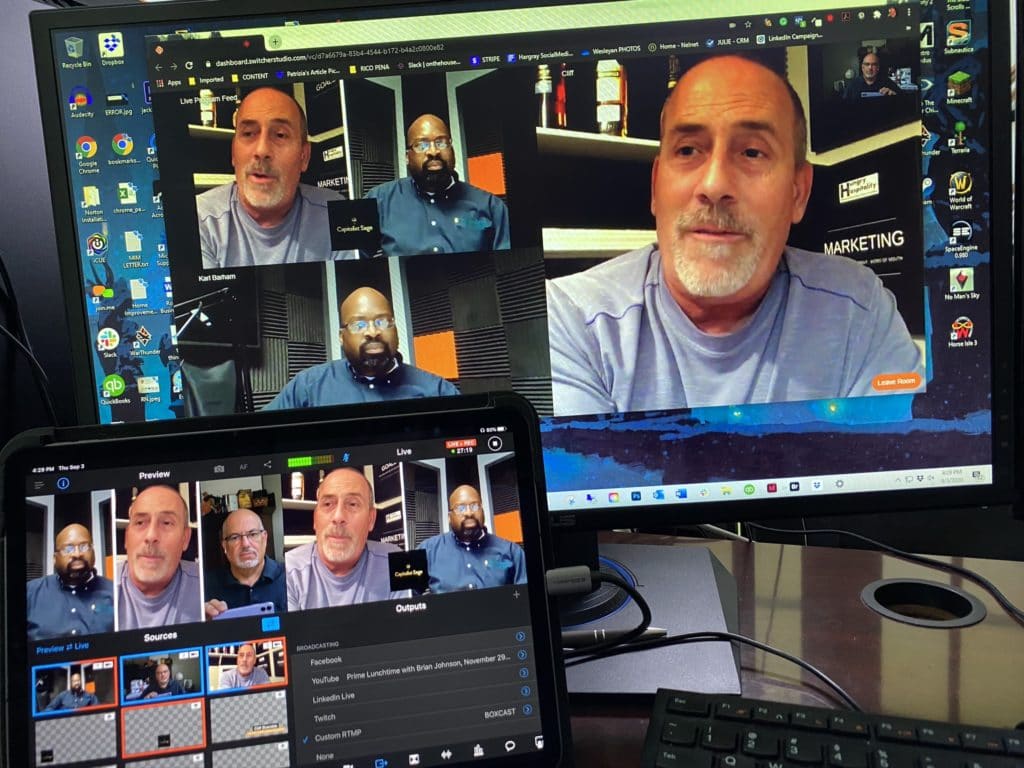
Podcast Transcript:
Karl: [00:00:30] Welcome to the Capitalist Sage Podcast. We’re here to bring you advice and tips from seasoned pros and experts to help you improve your business. I’m Karl Barham with Transworld Business Advisors, and my cohost is Rico Figliolini with Mighty Rockets, Digital Marketing and the publisher of the Peachtree Corners Magazine. How’re you doing Rico?
Rico: [00:00:47] Hey, Karl. Good. Thanks.
Karl: [00:00:49] Well, why don’t you tell us a little bit about our sponsors today?
Rico: [00:00:52] Sure. Let’s go right into it. Our lead sponsor I want to thank is Hargray Fiber. They’re a major company in the Southeast that handles fiber optics, internet connection at the speeds you need. And also because they handle, because they’re right in the community, they’re not your cable guy, right. You could call them up, they’ll be right out there. They’re very attentive to their client’s needs. Whether you’re a small business or you’re a large enterprise business, whether your employees are working from home or home and office, they’re providing all the smart office tools that you need to be able to do the work that your company needs to be able to get sales done. So check them out, they’re HargrayFiber.com. Or you can go to Hargray.com/Business and check them out because they have a thousand dollar Visa gift card going, promotion. And you may be one of those if you hook up with them. So check them out. Thank you to Hargray Fiber.
Karl: [00:01:49] Thank you. Thank you Hargray for continuing to sponsor all of the podcasts here. Today I’m excited to bring back a guest that joined us when we started this, if you remember. Cliff Bramble, founder and owner of Hungry Hospitality here in Gwinnett County. He’s here to talk a little bit about his perspective and experience and thoughts on business, small business in particular restaurant. 2020, it’s been a tough year for so many businesses. And in particular, you’ll see a lot of restaurant business being impacted. But I’ll tell you, being able to understand the history and what makes things work, is a great conversation to just show how we could support small business and maybe even talk a little bit about what it’s gonna look like post COVID. So Cliff how’re you doing today?
Cliff: [00:02:41] I’m doing great. Thanks for having me on.
Karl: [00:02:43] Well, many people might already know you and so on, but I’d love for you to share your background with folks so they can understand the many, many things that you’ve done in your career.
Cliff: [00:02:55] Absolutely. So, I live in Peachtree Corners. So I’m around here quite frequently. I was, I had the Nobel Fin going for quite some time until COVID came in. So I’ve been in the restaurant business for many years. I cofounded Rathmines Restaurants many years ago. And in the meantime, after that, ended up opening up Noble Fin. And now I just started a new company called Hungry Hospitality because, Noble Fin, I had to close it. Which isn’t a good thing, but we had to do what we had to do to start with COVID. But being in the restaurant
business and also real estate and also investing, I’ve been working with businesses for many years and I really enjoy it. It’s always a fun thing to do.
Karl: [00:03:35] Well, that’s what we’re here to talk to is the small business owners. We know it could be lonely owning your small business and having others to be able to share ideas with talk, to get ideas from, we know is very helpful. And so, why don’t we jump right in? And I’m curious when you did all your experience in a restaurant, what are some of the things that attracted you and many people to the restaurant business? From a business perspective, why do you think people get into that?
Cliff: [00:04:03] Well, you know, there’s a lot of glory in restaurants. A lot of people love to be in it. There’s, you know, there’s many people that will say, Hey, I’d love to open a restaurant. I don’t know about right now, but over the years they always have. But there’s always a lot of excitement. There’s a lot of adrenaline that’s going on. You know, there’s that. You’re around some nice people all the time. You’re around people all the time. And some people think it’s just an excitement thing all the time. You’re always excited. There’s always something going on. And although there is, you still have to run the business, with the HR and the hiring and all the other aspects that go into it. But the restaurant industry, it will come back. It’s having a challenge right now, but it will come back and there’ll be just as many people in it.
Karl: [00:04:44] Yeah. Over the years, I think one of the things is I always associate restaurant with creating memories. People get engaged, they have family feasts, birthdays, mother’s day, father’s day. And no matter what is happening in the economy or the world, people are going to want to celebrate with other people. They’re going to do it over food. And so we know that that’s going to sustain over the long term. What are some of the things that people, when you think about restaurants, they don’t know about the restaurant industry that you think they should for folks that have been in it for awhile?
Cliff: [00:05:18] Well, a lot of people may, again, people think it’s a fun industry. You, number one, you have to be there when you open up a restaurant, you really have to be there most of the time, especially if you’re independent. If you’re working with five and six other restaurant groups or you own it, and you have the luxury of hiring people because you’re a very profitable organization, you will have less time within the restaurant and more time operating the company because somebody still has to run the company. But the options are, is that people don’t see the hard work, the sacrifices that go into owning a restaurant. If it’s your kid’s birthday and you own a restaurant and you’re opening and it’s Friday night, you probably have to be there. It just depends on what people’s version and definition of fun and excitement is, but there’s a lot of hard work that you have to be there all the time.
Rico: [00:06:09] You know, I remember when we did a podcast, not too long ago, about your travels to Italy. Yeah, that was fun. I mean, you shared some pictures. You talked about the food and all that. Do you miss any of that? Do you miss being, you know, I know it’s only been a
little while. You know, but sometimes I feel like people leave a business and it doesn’t take long for them to miss it. Like a few days even.
Cliff: [00:06:34] Yeah. It’s interesting. You mentioned that if somebody asked me that the other day, just yesterday and he said, Well, are you going to get back into it? And I said, listen, I’ve been doing this for about almost 40 years. And, I’d love to say that I want to jump right into it, but I have to tell you I’m having a good time not being in it right now. So, you know, what you do realize is all of a sudden you realize all those things that you really couldn’t do over the years and you missed, all of a sudden they’re back at you. But you do miss the, you know, the fun of the excitement on a nightly basis, meeting all the different people. Because you do meet a lot of people in the restaurants and you have a lot of friends in the restaurants or acquaintances. But the other thing you miss is you miss the good food. So we cook at home all the time now.
Karl: [00:07:22] I’m curious when all, COVID-19 started to happen, where did you first hear that something was happening? How soon did you hear something was happening? What was your first thoughts and reaction to that?
Cliff: [00:07:35] Well, I’m involved in investments and financial side as well. And I’ve been, I started watching it in December to be honest. And, so in December I really watched it and in January I became obsessed with it. To a point where, I was up at three 30 in the morning, reading news from other countries, from that all the way to the East or the West, wherever it was. That was already happening and I was watching it. So for the month of January, I watched it and I read. I read a lot of information about it and I kind of warned a few friends of mine. I said, you know, if this comes over here, restaurant wise, we may end up having a big problem. Now I didn’t know how big of a problem it was, but watching it escalate, I took a lot of screenshots basically when the John Hopkins first started tracking. It had, there was two people. I have a screenshot with two people in the United States have it. And then it continued to go up and up and up. So, you know for me, I started watching it in January really, really, more so than December. But when I had over at Noble Fin, I did tell my staff in January. I advised them I said, listen guys, if this comes over here, it’s going to affect everybody. So start saving your money. And actually quite a few of them thanked me later on. And they said, man, I can’t believe that. But we did save our money and thank you very much. So I watched a lot of it in January. And then obviously in February when it started to pick up, you know, it just continued. I think the financial markets, in my opinion, kind of ignored it in January. You know, just paying attention to it, wondering what was going to happen on the hospitality side. It took a mind of its own and obviously where we are now today.
Karl: [00:09:19] Yeah. I remembered you actually being one of the first ones to talk about it and, you know, we were chatting and you were starting to do that early March, late February, early March. But I don’t know that people really understood how long this would be around. And we all didn’t know enough information about how we responded and how many. There was a time there were country that had a spike and then they got it under control and everyone thought that that’s what happens. But decisions and choices and behaviors and all these things played in.
And we’re a big country with a lot of complexity to it. 50 States, a lot of different approaches to tackling it. So, when you knew that it was going to impact your business, I know there are things you can do generally. Is there anything looking back, you’d advise the restaurant industry as a whole or people that are leading large in the food and beverage space, things that a year ago, you know, hindsight’s always 2020. Things that a year ago, things that could be done to prepare, if something like this were to happen. What would be some of the things in the food and beverage space that good business people could do? Could have done?
Cliff: [00:10:38] Well, one of the most important parts really for me, was making sure you had enough cash flow in a situation like this or any emergency situation. And, you know, I’ve worked with my accountant and it’s very interesting. Making sure that you have enough cashflow for three or four months. And most people in the, you know, we’re all in the same boat. Most people in the United States only have two or three months worth of a fund saved. In a restaurant the same exact thing. You do have to treat it as a business because that’s exactly what it is first. The fun of the restaurant has to come second. But having the cash in bank and making sure that you have enough for an emergency situation, honestly, it helped me tremendously this time. Now obviously you can not predict what’s going to happen how far along this is going to go. But, there still are, you know, we’re still in the pandemic. There’s still restaurants that are having challenges, especially in different segments. So you know, when it comes down to it, in my opinion, no matter what business you’re in you always have to plan two, three, four, five months worth of cashflow to make sure that you have that. Because when you need it and you don’t have it, you can’t get it.
Rico: [00:11:46] Let me ask you something. You know, I don’t think the restaurant business. Is immune to things, right? They’re listeria outbreaks, the salmonella outbreaks. Those are common. Every day there’s always a recall somewhere in the country for something. Especially romaine lettuce. Well, romaine lettuce from Arizona, I guess, or wherever it comes from. It’s like that one place, you know. So you have all that going on and then you have the pandemic on top of that because you have the normal stuff like that. So do you see this coming back? I mean, they’re talking about it coming back again. You know should restaurants are planning out for this type of thing beyond the money? You know, how do you plan the health wise? How do you keep things clean? And not that you know, a pandemic this may not matter, I guess the cleanliness. But how do you, what do you see there?
Cliff: [00:12:42] Well, I wish I had a crystal ball. I really do, but you know, restaurants in general are clean. You know, we clean them all the time. You have a cleaning crew or you have an outside company who comes in and cleans it. So it just, it really depends, but you still have to remain diligent on what you’re doing and you have to continue to train your staff.That’s there and make sure the management is on guard. Make sure that everybody’s paying attention. Because it, you know, what happened to me over at Noble Fin is really the reason why I ended up closing the first time in March was because somebody walked in. And then they had a party of 10, but they came from out of town. They called up two days later and they said, Hey, by the way, I think I may have COVID. You may have to tell your staff. So that was a real big
eyeopener for me when I’m dealing with hotel guests from the Marriott locally here, and, you know, the international companies that are around Peachtree Corners and Gwinnett. That was a big eyeopener. So you know, keep being diligent about listening and watching what’s going on and listening to your staff because your staff will tell you a lot of what’s going on. But more importantly, you have to continue to remain diligent and be clean and make sure you’re paying attention to everything around you. You can’t just be paying attention to your four walls within that restaurant. You have to be paying attention to what’s going on in the business world as well, because it does affect restaurants.
Karl: [00:14:07] That’s a good point. Early on information was flowing from so many sources to help guide you on restaurant safety and protocol. What was the right source to listen to? How do you figure out who to pay attention to?
Cliff: [00:14:24] That goes right about now too, we’re still trying to figure it out. You know what? The Georgia restaurant association has a great page on COVID. So, you know, any restaurant, or individual, or an employee of a restaurant or hospitality field, they can go onto the Georgia restaurant association webpage. And they have a great COVID, it’s a webpage with all types of resources on it. So that was something that I really paid attention to because they were very keen on keeping that up to date on a daily basis. Even though every day something came out differently. They were very good at keeping their website up.
Rico: [00:15:01] What did you, did you find useful the other resources that the association provided? I mean, obviously the restaurant industry is different than other industries because of the employees. And just the nature of sustainability and all that product. When it came to the Cares Act, to PPP, to loans, to payroll. You know, when business is not happening, was that any of that useful to you? I mean, I know you did a lot for your employees. God knows. I think anyone that lives in Peachtree Corners knows that Cliff Bramble, Noble Fin. You guys really, you really employed your employees as long as you could.
Karl: [00:15:39] And the community.
Cliff: [00:15:41] We did. We did. I honestly, I mean, we did pay attention. You know, when the Cares Act came out, I was very much aware of that coming out four or five weeks ahead of time with my fingers crossed because I told my staff the same exact thing. Hey guys, this is, if this comes in, I’ll be able to help you guys for this much longer. And to be perfectly honest, I mean, I kept a lot of the staff on. I couldn’t, I think 26 staff members on for the nine weeks that we were closed and they got their paycheck. You know, and that was important to me because we opened back up, everyone of those employees was back there to work. Which is a great feeling. So, you know, so yes. The other items that were out there and the people that, you know, friends of mine in the business world also. You know, from my banker to my accountant, we were all kind of talking about the same exact thing. So, we all help each other. And, there was a lot of guys in the restaurant business that I spoke with as well. We had a few, what do they call the zoom meetings, right? We had a few of them. Which were pretty cool because everybody
really helped each other. And I think that’s what the industry is really needing right now, is people to help each other being in the same industry.
Rico: [00:16:50] Well, was it a little scary at one point when they were sort of changing the rules of the game a little bit? Like you had to spend it all in eight weeks and then you could spend it in 24 weeks. Maybe some of it’s forgiven, maybe not some of it, that formula was changing. Was any of that scary?
Cliff: [00:17:07] You know what scary could be a word, but confusing is more of the word. There’s no question about it. I mean, you try to become an expert at this stuff because you know, you’re learning about it, but you’re trying to learn as much as possible. And, I have several, you know, several email friends that would send me information. Hey, this is what’s going on. My banker would send me information. I would go to treasury.org. I would go to all the different government websites and pull down the latest information. But man, confusing is the word, because, you know, one day you go, wow, this is fantastic. And next day you’re up and down. And honestly, you know, you think you lose sleep when you have a restaurant? Go through COVID and own a restaurant, you’ll really be losing sleep. And that’s probably with any business too.
Karl: [00:17:52] Right. I wondered when you reopened and people started coming back, what were some of the, you know, the response the community gave as people started going back out to restaurants and as you walked around town? What was your general sense and feel on how people felt about it?
Cliff: [00:18:10] You know, we opened back up May 25th. It was eight weeks after we had first closed. And I think we were one of the earlier ones that we opened up. And I felt that at that time it was probably a good time because I didn’t know how long this was going to continue. But the people who came in, I have to tell you, we had a very, very supportive clientele and a lot of the people who had frequented the restaurant over the years, they were the first one’s back. Yes, there were some people that came in with masks. Yes, at the very beginning. But we did everything that we possibly could to make the people feel comfortable. But when it comes down to it, you know, the people who came in, they were very supportive. They were very happy that the restaurant was back open. They enjoyed the food and they came back a couple of times. But as the confusion set in, you saw less and less of them.
Karl: [00:18:57] Yeah, yeah. I know people are happy now. If you fast forward to today, restaurants are open and people are going out to eat. Yes, the world’s changed a little bit, there’s a little bit more spacing and so on. But I’m looking in the future, there’s a short term where, you know, until, vaccines are available and so on. We’re going to school dealing with this, we’re working dealing with this, we’re living our lives dealing with this. What do you think the restaurant industry is going to look like over the near short term? And I’m going to ask you, what do you think it’s going to look like a little bit further on? How does this change how
business owners approach food service, delivery, in dining experience. How do you think this could change it? And any of them for the better?
Cliff: [00:19:42] You know, the restaurant industry, I think right now is changing on a daily basis. But, you know, we’ve gone through a lot of different changes in the last six months. Let’s face it. We went from being like, for example, you got quick service, you got full service, you have fine dining, you have fast food. And what happened for me, for example, was you know, we went through the whole process of, okay, let’s see if we can continue with the sale. So we started to-go stuff immediately. And then from there you started selling stuff online and then people started ordering it online. But now you go into the future and all that stuff is still happening. Where there’s a lot of people eating outside. But let’s face it, it’s 95 degrees outside. At nighttime it’s fine. I know a couple of places that they set up their patio and outdoor front, and they look really, really cool. And people do dine in them. But the future-wise, I mean, you’re looking at home delivery. You’re looking at more chefs cooking at home, chefs from restaurants maybe doing meal preps. And that’s already happening. You know, and there’s also a lot of virtual cooking classes as well that’s going on. Where chefs or restaurant owners are doing the virtual cooking classes from their kitchen or they’re doing a zoom cooking class, basically. So the nice part is, is it’s working and people are going with it. What’s going on in a year from now? I don’t know. I mean, there may be some consolidation, but there’s also a lot of companies out there with some pretty deep pockets. That are looking for good brands to purchase with great locations because the restaurant industry, it’s not going anywhere. It will consolidate, it will change, but it’s going to come back. Sooner or later it will come back. But we are dependent on the hotels, just like hotels are dependent on us. And I know in Peachtree Corners there’s still one, at least one hotel that I know of that is not open. But this is people in this area, the less traveling we do, it does provide a challenge for what’s going to happen now or in the future as well.
Karl: [00:21:38] I’m curious. In New York I saw some areas of New York city shut down the streets and allow the restaurants to go out into the streets, where they get the advantage of spacing and they’re able to deliver a different experience. But also, do you think there’s a future and figuring out a way to leverage outdoor space and eating for the short term. And then I’m sure, you know, over time and it’ll go in there. Have you seen any innovations in that area?
Cliff: [00:22:10] You know, most of the cities and the towns have really eased the restrictions on the outdoor dining. I know Peachtree Corners has, so that has helped tremendously. You know, it’s really up to the building departments up to the coding and also how long this is going to continue. Hopefully there’s a vaccine where we can all say, okay, in six months, eight months, this is all done. And people are back dining in air conditioning, rather than sitting in 95 degrees.
Karl: [00:22:33] Yeah.
Rico: [00:22:33] Well, you know, I think that this has shown us though that this could happen again, right? I mean, this is just, this can happen again. And it doesn’t take long, right?
Transatlantic flights. I mean, by the time anyone really knew what was going on. We were already deep into it, you know what I mean? You were able to see it coming, maybe so were other people, but obviously some people ignored it. And it came and slapped us in the face. It was really bad in Italy and Greece and some of the other countries in Europe. But like you were saying things change, right? Yeah, I think there’s more ghost kitchens going on now.
Cliff: [00:23:09] Absolutely.
Rico: [00:23:10] Right. And to explain that to some people that don’t know what a ghost kitchen is.
Karl: [00:23:14] What is a ghost kitchen?
Cliff: [00:23:15] Well you know, there’s a place called Prep Atlanta over by Spaghetti Junction. They have, I don’t know how many, I’d like to say there’s about 75 to 100 different, 100 square feet. Some are 80 square feet kitchens. And I’ve been in two of them. One of my old chef has a food truck and he took me into one of his places and man it was pretty cool. But basically they’re doing all the prep there and then they basically will deliver it to somebody else. I know Elon Musk’s brother is heavily involved. He raised about, only about $500 million to start these virtual kitchens around the United States. So the virtual kitchen, it could be something where you have a restaurant where Noble Fin used to be, for example, and have four or five different kitchens only in there. And basically you order everything online and you just go pick it up. So it remains to be seen, but I think that that virtual kitchen definitely has a huge lifespan coming up to it.
Rico: [00:24:11] If you see what’s going on with like Domino’s pizza, right. The pizza industry is really good at this. There were set because most of their stuff is delivered anyway, right? So Domino’s is no, I think it’s Domino’s right. There’s no sit in, it’s all delivery, right? It’s all curbside or pick up or delivery. You’re seeing more of like what you said. And I’m seeing companies that are doing four different brands within a ghost kitchen. Like they own the whole thing, but they’re doing it for, so that pizzeria, mexican, chinese. They own all four brands let’s say and they’re in some hole in the wall place that’s conditioned for a kitchen and they’re selling right?
Cliff: [00:24:50] Delivery only.
Rico: [00:24:51] Yeah. And then, like you said, your chef started a food truck, right? So I’m seeing more of that.
Cliff: [00:24:58] And I’ll tell you, what’s interesting. He goes to neighborhoods too. He goes to different neighborhoods where, when all of a sudden when, you know, this whole COVID came in. Obviously the business parks had disappeared. Or the people, the parks are there, but the people weren’t. So he ended up going to neighborhoods where they would call him and they have 40, 50 people there and he’d serve them on like a Tuesday night.
Karl: [00:25:21] Yeah. We saw a few of those. Those are good. We ordered dinner, when they would pick neighborhoods from different restaurants, we thought that was fabulous. I’ve got a question that might be more technical. Since you, one of the biggest costs for restaurants is the space, the real estate, the space you’re in. Do you think this is going to have an impact on commercial real estate, being able to charge the same rates, if you can’t have as many people in a space. How do you think that’s going to affect that part of the business model for restaurants?
Cliff: [00:25:57] Well, you know, it’s interesting that you say that. But, you know what, when it comes down to the per square foot, you know, the restaurants are going to move out and restaurants live off of what you’re sales are per square foot and also what your rent is per square foot. And if you have a large restaurant and the rent is, you know, $40 a square foot. You know, in Georgia, in Atlanta, it’s probably a lot less than other parts of the country. But you also have a sales forecast for that specific restaurant square footage. So knowing what your sales are going to be or what they forecasted compared to what they are, the rent will be. And it’s, especially with only at 50% seating capacity, it’s going to provide a challenge without a question. So there are going to being landlords out there trying to charge more rent. It depends on how bad somebody wants a location. If somebody wants to pay for it and they want to be in a restaurant. If they have 4,000 square feet and they need to do $600 a square foot, which is on the medium level. They really want to do $800. So that’s three and a half million dollars in sales, but if they’re paying a low $20 a square foot, that’s great. But if they’re paying 35, your occupancy costs are going to be way too high. So it’s very important to pay attention before you go into it and know what you’re sales are what you think they’re going to be. But with COVID, you know, the next six months we just don’t know.
Karl: [00:27:20] Right. Yeah. And I see, I know with all the vacancies that are happening or projected to happen between retail, restaurants and others, it’s going to have an impact. I remember December, most landlords were pushing price increase in lease updates. Some may still it’s all very local. So it depends on laws, or people, or location. But if the model changes where you can’t drive as much revenue, whether it’s by people or the price you charge, you can’t get the sales volume. Don’t you think that that will force landlords to have to either face vacancy or build a model that allows, you know, business owners to be successful and come to the table. Now over time, like it happens every other time prices will increase again. But for the short term, it’s important that we, that somehow that gets figured out.
Cliff: [00:28:19] Well, you know, listen, we all know there’s going to be a lot of retail space available within the next six months. It’s already happening. You know, whether it’s here in Atlanta, West side, downtown, you go to old fourth ward. I mean, there’s so much happening right now. You look at Alpharetta. Alpharetta is, you know, it continues to grow. Peachtree Corners, there’s buildings here, but there’s also empty buildings as well. So the more of these companies that are not letting or telling their employees to stay home until June of 2021, it provides all of a sudden empty space. Now they still have leases on them. Some of them maybe they own the building, but it’s all really dependent on whether they can work it out with the
landlords. I got an email today from somebody who’s closing a bunch of restaurants and one of the main reasons was because they could not work out a solution with their landlords. So ultimately the landlord is either going to have empty places for, until COVID is over or there’s going to be somebody else who walks in and says, Hey, I have five brands and I want to put them in that place. Maybe for a virtual kitchen. You just, you just don’t know.
Karl: [00:29:20] That’s gotta be. So what are your thoughts on someone thinking of getting into the restaurant? Just finished working at some restaurant, moving into the Metro Atlanta area. Any advice to folks that might be looking to step into it?
Cliff: [00:29:36] You know what, if they’re looking to get a job right now, you know, there are a lot of jobs out there where people are looking for, restaurants are looking for people. You look in the suburbs right now. Suburbs are pretty much doing better than in town. Because a lot of the in town, especially downtown is reliant on the hotels, downtown Atlanta. But the suburbs right now are the places to really find a job. Because the suburbs are coming back a lot more quickly in the restaurant side. Not as much as the hotel, but definitely in the restaurant. It’s coming back more quickly. So the jobs are out there. They’d have to look in the suburbs before they go in town.
Karl: [00:30:09] And as for a career path for someone that wanted to own a restaurant. What types of positions and roles would you recommend someone craft that they wanted to build a career to be an owner of a restaurant one day?
Cliff: [00:30:24] Well, you know, if they wanted to be an owner of a restaurant right there one day, they could probably buy a lot right now.
Karl: [00:30:31] And are they ready?
Cliff: [00:30:33] But they might not be ready. But you know what, it comes down to they have to continue to learn. They have to continue to work at another restaurant. They have to learn from somebody else who’s doing that. And you know, no matter what industry that you’re in, you have to learn and do the job before you actually become an owner of the job. Or owner of the business. So if somebody wants to get into the chef position, they have to learn how to cook. If somebody wants to learn how to do the business side, they have to learn the front of the house stuff. So it’s really important that they still have to be working for somebody to learn from somebody. They can do it in school, but they’re going to learn a lot more on property inside a restaurant.
Karl: [00:31:12] Well, I want to thank you for sharing some of your wisdom and experience navigating through not only just this crazy 2020, but an industry that already has its ups and downs and challenges, and you continue to be successful in all things you do. Anything you have coming up? So what keeps you busy nowadays? What type of stuff you get yourself into?
Cliff: [00:31:36] Man, you know, I’ll tell you what I’ve been doing a lot of pivoting you know. And when we had Nobel Fin, we pivoted to to-go, then we pivoted to online and, you know, ended up closing that. But I started a new company called Hungry Hospitality, which really it’s my main focus now. So I’m working on that and I’m working on these classes called audio business classes. They’re really business classes that are online and there’ll be subscription basis. There’ll be coming out probably sometime in October. And it’s really geared to the hospitality industry, but also the business industry as well. So it’ll be something a little different, but I think it’ll allow people to learn 24/7 and basically download whatever they need. So it should be interesting.
Karl: [00:32:16] Cool. I know a lot of people that would be able to really use some of that wisdom to share.
Rico: [00:32:21] Where can they find, what website can they go to? Where they, where can they find you if they want?
Cliff: [00:32:26] Yeah. Right now all my information is on HungaryHospitality.com. Right now that’s the consulting side. And the consulting side is really working with the restaurants, working with business owners, real estate people, realtors. And you know, a lot of people could use, they always say, man, I never knew this stuff. And you know, the nice part is if they want to learn how to open up a business, it’s better to have somebody who has already done it then trying and making all those mistakes and costing them a lot of money when somebody can guide them to it and help them immediately.
Karl: [00:33:01] Oh, absolutely. It makes perfect sense. Well, I want to thank you Cliff Bramble with Hungry Hospitality, local business leader. And I just want to thank you personally, for all the things you did in the community. Bread you were giving away during the time just being a voice.
Rico: [00:33:21] How many pounds of?
Cliff: [00:33:22] I was making that in the back kitchen and having a good time.
Rico: [00:33:25] You came up with 400 pounds of dough or more,
Cliff: [00:33:28] I think in total, almost 800 pounds of dough. But it was good, you know what I mean? It was a good time, the people enjoyed it. And you know what? I think that the people needed something like that. And, you know, you have to do something like that and get back to the community because the local people are the ones that helped you out in the first place.
Karl: [00:33:44] Well, I want to thank you. You’re a great example for the community and continue to wish you all luck on some of your new endeavors. Well, for today, I want to thank everybody for joining the Capitalist Sage. I’m Karl Barham with Transworld Business Advisors of Atlanta Peachtree. Our business is to help business owners figure out what comes next in life,
whether they are looking to exit the business, sell, whether they’re looking to acquire a business to grow through acquisition or through franchising. We help people realize those dreams. You can reach us at www.TWorld.com/AtlantaPeachtree. Rico, what do you have coming up?
Rico: [00:34:23] Sure. Well, I’m Rico Figliolini. I have MightyRockets.com and we’re a social media content creation company. But I also publish Peachtree Corners magazine so that’s six times a year. Keeps me busy. Talking about passion, I love doing this stuff. I have great writers with me. We’re working on the next issue right now. So part of that is pets and their people. We’re going to be running a, we’re launching a giveaway next week on that. We’re also doing, asking people to give us what they’re thankful for. So our hopes are accumulating 50 people and what they feel they’re thankful for this year. Besides family and friends, we’re all thankful for that. But what else are you thankful for? So you want to get a sense of what that is in Peachtree Corners. We’re curating that and putting that in the magazine. And we’re also wanting to be doing a bunch of other things, including backyard retreats. So we’re profiling five of those. Really some great looking backyard retreats that people can go to. There’s one place, I forget how many acres it is, smack in the middle of Peachtree Corners, has its own rapevines and place to just hang out. It’s kind of a neat place. That’s one of the places, but we’re doing all that. So and these family of podcasts we’re doing. Because you’re the heavy lifting, scheduling everyone on these podcasts and it’s kind of cool. You’re bringing in really good interesting people. Cliff this hour, this half hour was really, really good learning about you and the business. So all that, and we’re fortunate to have Hargray Fiber as a sponsor of these podcasts. So if anyone wants to find out a little bit more about what’s going on in Peachtree Corners or any of the podcasts we do go to LivingInPeachtreeCorners.com and you’ll be able to find out all sorts of things.
Karl: [00:36:15] So I want to mention one more thing as we wrap up today. It’s great having folks like Cliff and other business owners all over the community, because I don’t know if a lot of children get to see business owners. They go in patron in the business, but they don’t know the people in the community that do it and some of these things. And so if this helps to prepare the next generation to be great business owners, small business owners I think, it’s going to drive the economy. So, this is a joy for us to do and we want folks to follow us on Facebook. And on Facebook, is it Living in Peachtree Corners?
Rico: [00:36:53] Well, it’s Peachtree Corners Life on Facebook. So if you like the page, right, and you’ll get alerts for it. If you go to YouTube and you search Peachtree Corners Life. Subscribe there and you’ll also get an alert because we’re doing these things live to YouTube simultaneously if we don’t get dropped. So I think we went about 27 minutes before we got dropped. So the full version will be up after this.
Karl: [00:37:17] Awesome. And then the website?
Rico: [00:37:20] Well, the website is LivingInPeachtreeCorners.com. and on Instagram, we’re Capitalist Sage so check it out.
Karl: [00:37:29] Absolutely. Well, thank you everyone for tuning in and thanks Cliff again. Take care of everyone. Have a great day, everyone.
Related
Business
Peachtree Corners Grows Business Opportunities Through Economic Development
Published
1 week agoon
May 6, 2025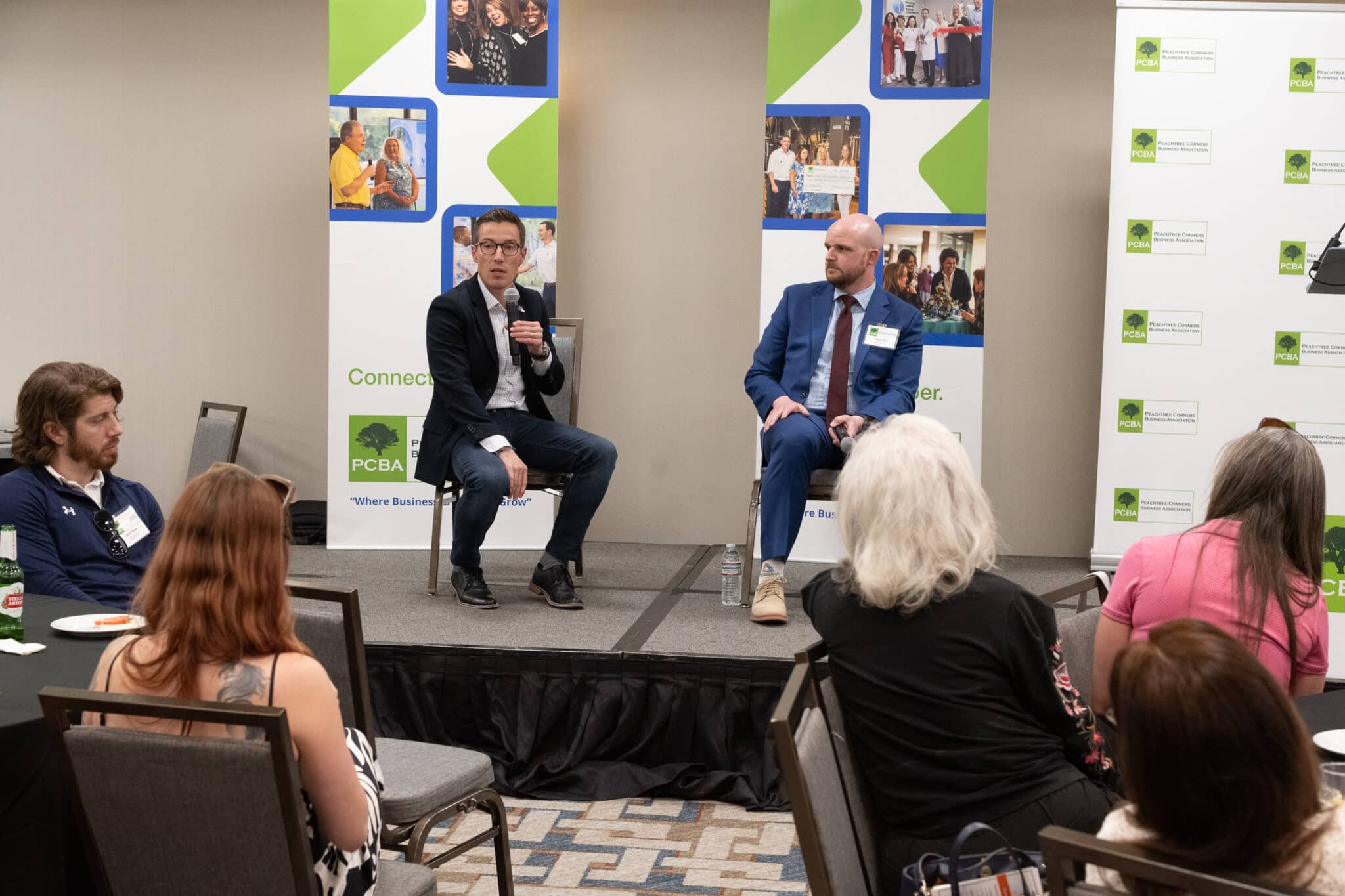
Most residents and business owners in Peachtree Corners probably think they know all about the economic development and strategic planning of Peachtree Corners, but do they really?
Peachtree Corners Business Association invited Peachtree Corners Economic Development Director Betrand Lapoire and Partnership Gwinnett Director of Economic Development Andrew Hickey to its After Hours Speaker Series on March 27 to discuss the city’s growth from a 1971 master plan to a bustling city with 42,000 inhabitants and 40,000 jobs.
Key points included the importance of business retention and expansion, with 24 projects last year creating 1,600 retained jobs, 1,600 new jobs and $250 million in new capital investment.
The Curiosity Lab, a world-class innovation center, was emphasized as a significant attraction. The city’s zoning and infrastructure plans were also discussed, focusing on balancing office and residential development to maintain a vibrant, sustainable community.
Matching jobs to residents
Although Peachtree Corners is just a teenager in terms of being an incorporated city, the foundation for this vibrant, fast-paced economic hub was laid more than 50 years ago by technology pioneer Paul Duke.
“Peachtree Corners was the first master-planned, business innovation technology park in metro Atlanta,” said Lapoire. “It was in response to the brain drain of technology with Georgia Tech graduates leaving the area.”
While the city may have a small-town feel, it’s the largest in Gwinnett County by population, but not land mass, he added.
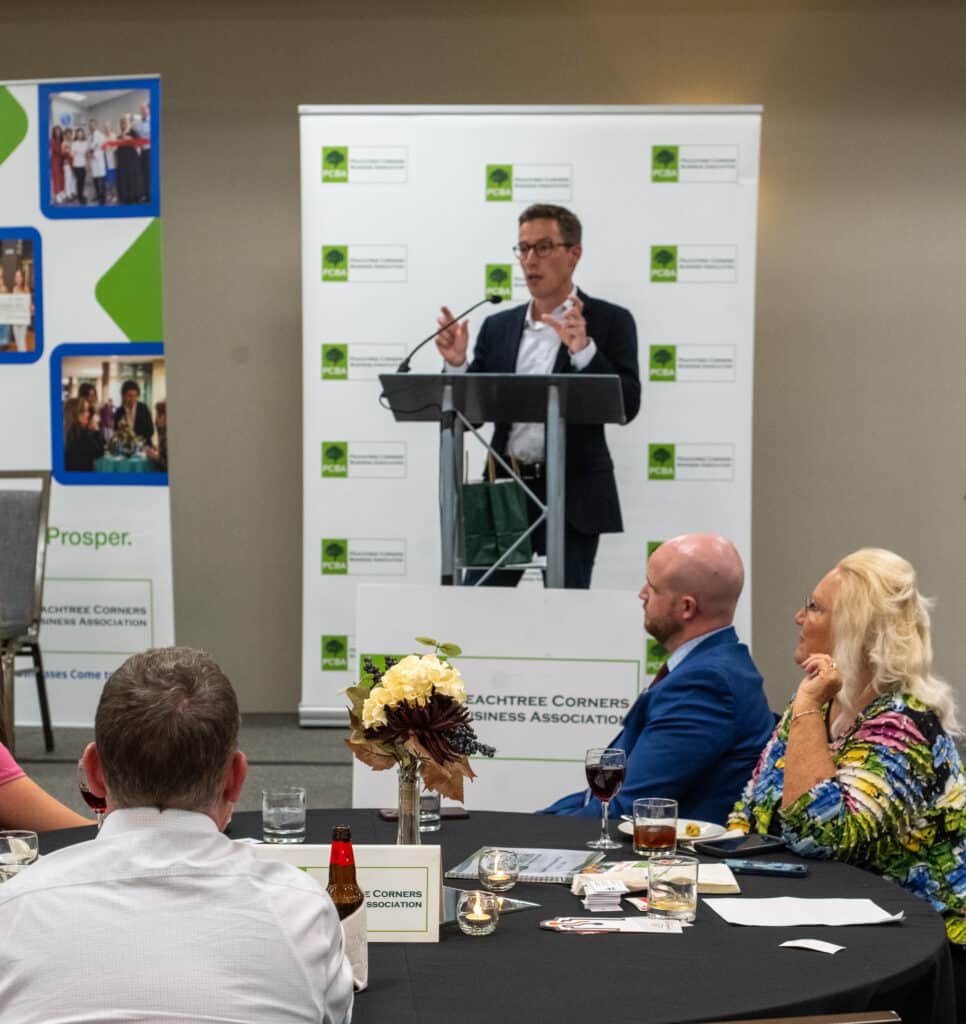
“The city started from a commercial, industrial, R&D base and then was expanded around it,” said Lapoire.
Though home to more than 42,000 residents, most of the jobs in Peachtree Corners are filled by people who live outside the city, he added.
“So we have this interesting mismatch, in a way, although not unusual,” said LaPoire. That creates traffic and transit issues. So that means that one of the solutions is to create more jobs here to fit the profile of the community.”
He presented charts that show professional services, consulting and engineering as the largest job categories. The next tier of businesses are wholesale and manufacturing.
“So we have a good mix of industry,” he said.
A five-year plan
The city has a five-year economic development plan (2023-2028) that outlines strategies for attracting and retaining businesses, with education and workforce development being key components.
Partnership Gwinnett has similar goals as Peachtree Corners, but on a larger scale.
“We are the county’s sales and marketing arm for all 17 cities now, and we receive funding from both municipal sources as well as existing businesses here — both in Gwinnett and outside of Gwinnett as well,” said Hickey.
He shared how Partnership Gwinnett is designed to drive a lot of major corporations toward doing business inside and with Gwinnett County.
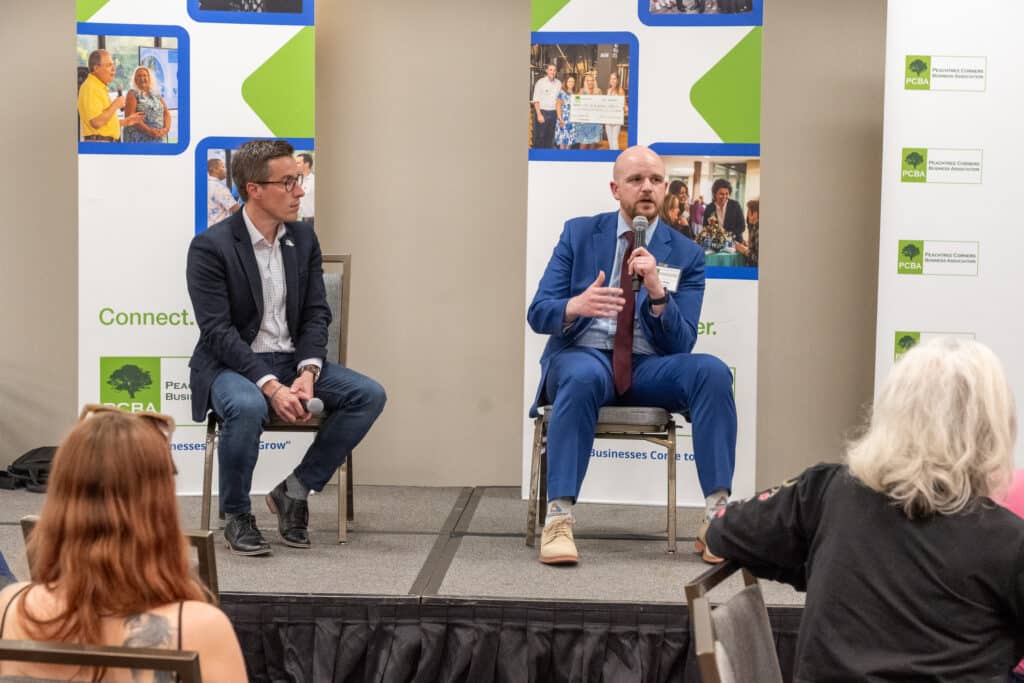
“One of the biggest things that we talk about that I’m sure it seems like most of us here, if you live here, you work here, you understand it. It’s the diversity that exists here in Gwinnett,” he said. “With a diversity index of 85, that means if we walk out of the Hilton here and we say hello to somebody, there’s an 85% chance they’re from a different ethnic or cultural background than ourselves, which to you and I may seem normal because that’s the life that we live in.”
He added that for companies, there’s a tremendous value in that, whether they have stated values, or they’re just making hiring decisions to get a wide range of candidates to fill those roles. Additionally, because of the proximity to Atlanta, Gwinnett County has a great labor draw.
Partnership Gwinnett
Partnership Gwinnett plays a significant role in recruiting businesses, expanding existing companies and developing the workforce. Hickey showed how the organization was involved with more than 24 projects last year.
“A majority of those were expansions, and that is a common thread you’ll see in economic development,” he said. “In business retention, expansion is so vital to working with our existing companies to make sure that they have the resources they need.”
He added that’s what leads to new investment and job creation in the community.
The organization also focuses on redevelopment projects, working with cities and the county to improve infrastructure and community amenities — especially strong educational institutions such Georgia Gwinnett College, Philadelphia College of Osteopathic Medicine and others.
Quality of life
In closing, both men stressed the importance of recruiting companies and developing the workforce, along with one aspect that means a lot but may not be as obvious — quality of life.
“It’s definitely evident that people like to work where they live — the whole live, work play experience,” said Hickey. “I joke that the part that people really have the most questions about, and are most excited to learn about, is new events at The Forum or Gwinnett Place Mall.”
Although they want to know what’s the next major company coming to Gwinnett, people REALLY want to know about how to spend their leisure time.
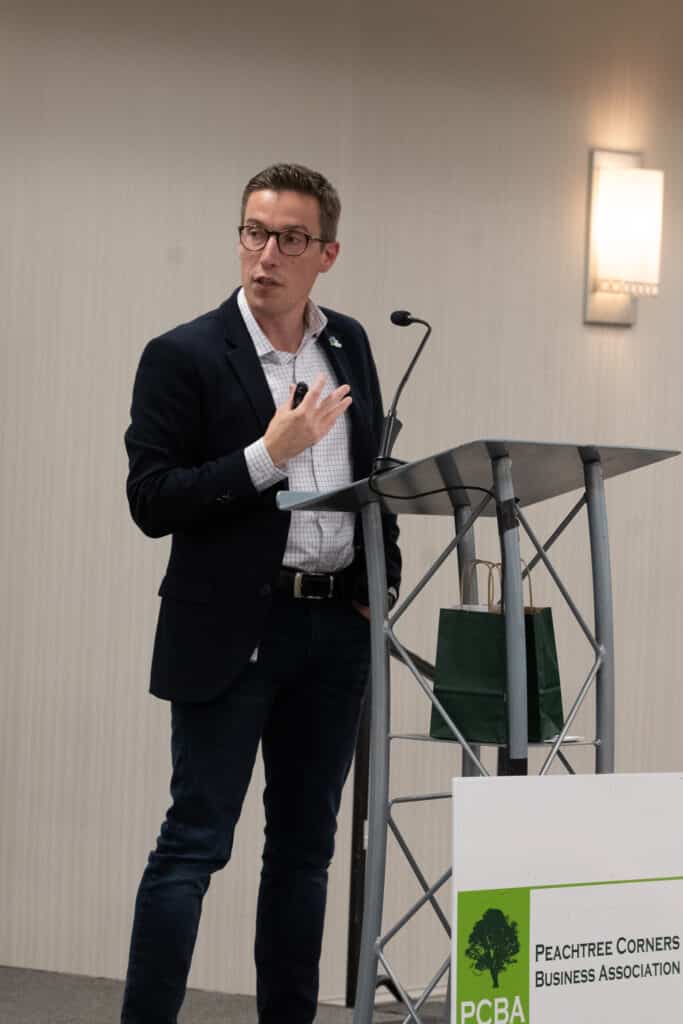
“That speaks to the importance of ensuring that we have a great community,” he said. “So at Partnership Gwinnett we work with all of our cities, and the county government as well, [on] a kind of a best-practices trip.”
He added that the peer tour allows everyone to know what the neighboring communities are doing and share the good news.
“We will take all of these elected officials, but also city staff, to different cities across the Southeast,” he said. “Last year, I believe they went to Huntsville, and have been to Greenville, Chattanooga — all cities that have done some really cool redevelopments that have taken their city to the next level. Our goal is to learn from them.”
Related
Business
Two Peachtree Corners Business Leaders Named Finalists for EY Entrepreneur Award
Published
3 weeks agoon
April 23, 2025
Ernst & Young’s Entrepreneur Of The Year celebrates ambitious entrepreneurs who are shaping the future
Ernst & Young LLP (EY US) recently announced the finalists for the prestigious Entrepreneur Of The Year 2025 Southeast Award, and two local, Peachtree Corners business leaders — David Quirk, president and CEO of DLB Associates Consulting Engineers PC and Erin Hanson, founder and CEO of Guardian Sports — made the list.
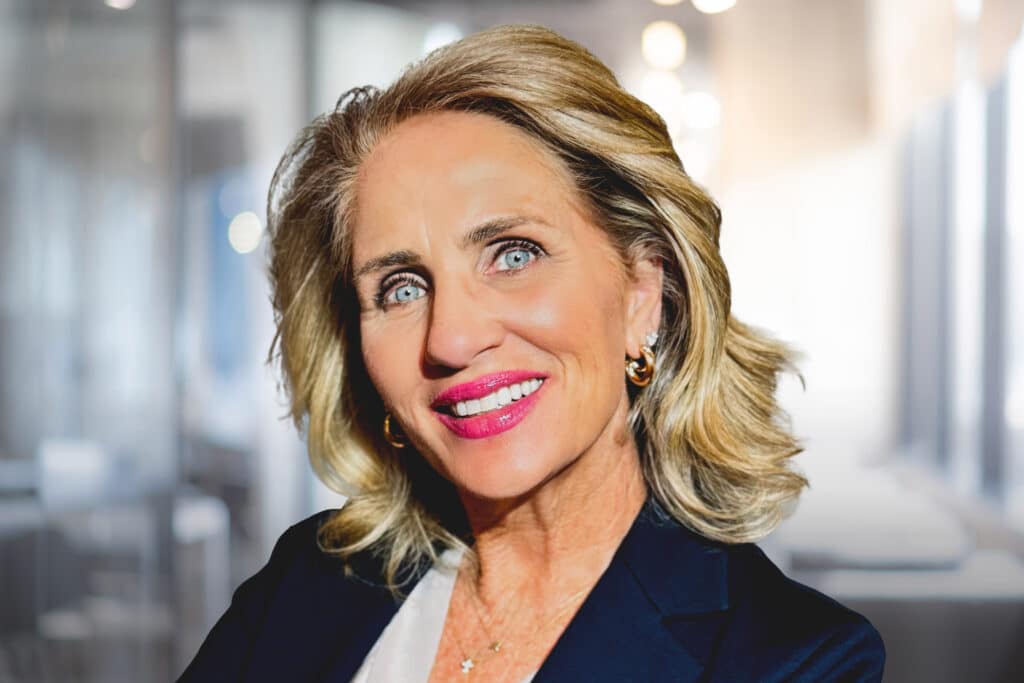
Hanson’s Guardian Sports is a family-owned company dedicated to serving athletes through safety and performance improvements in sports equipment. Major products include the Guardian Cap, PEARL ball and Guardian Infill serving the sports industry.
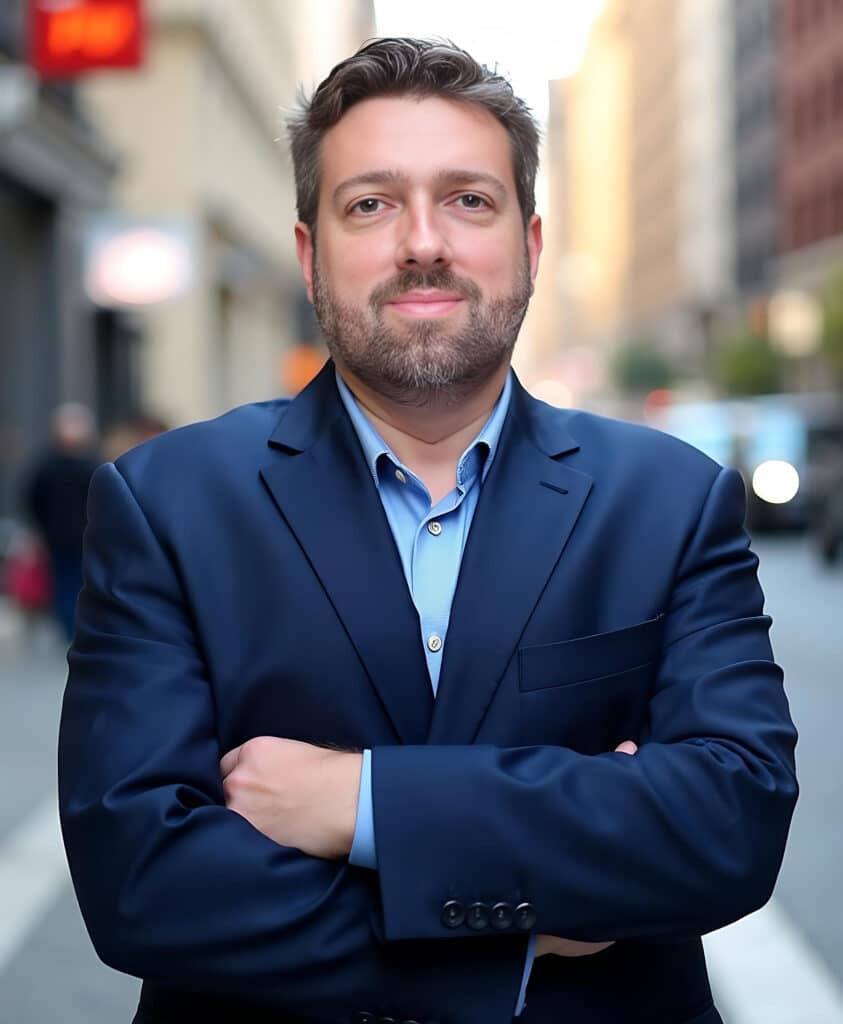
DLB Associates is a U.S.-based consulting engineering firm specializing in mission-critical and complex built environments. With more than 40 years of expertise, DLB delivers innovative, technology-driven solutions in engineering, commissioning and operations worldwide.
Celebrating entrepreneurial leaders
Now in its 40th year, Entrepreneur Of The Year recognizes the bold leaders who disrupt markets through the world’s most ground-breaking companies, revolutionizing industries and making a profound impact on communities. The program honors those entrepreneurs whose innovations shape the future and pave the way for a thriving economy and a hopeful tomorrow.
The Southeast program celebrates entrepreneurs from Alabama, Georgia, North Carolina, South Carolina and Tennessee.
An independent panel of judges selected 36 finalists for their entrepreneurial spirit, purpose, growth and lasting impact in building long-term value.
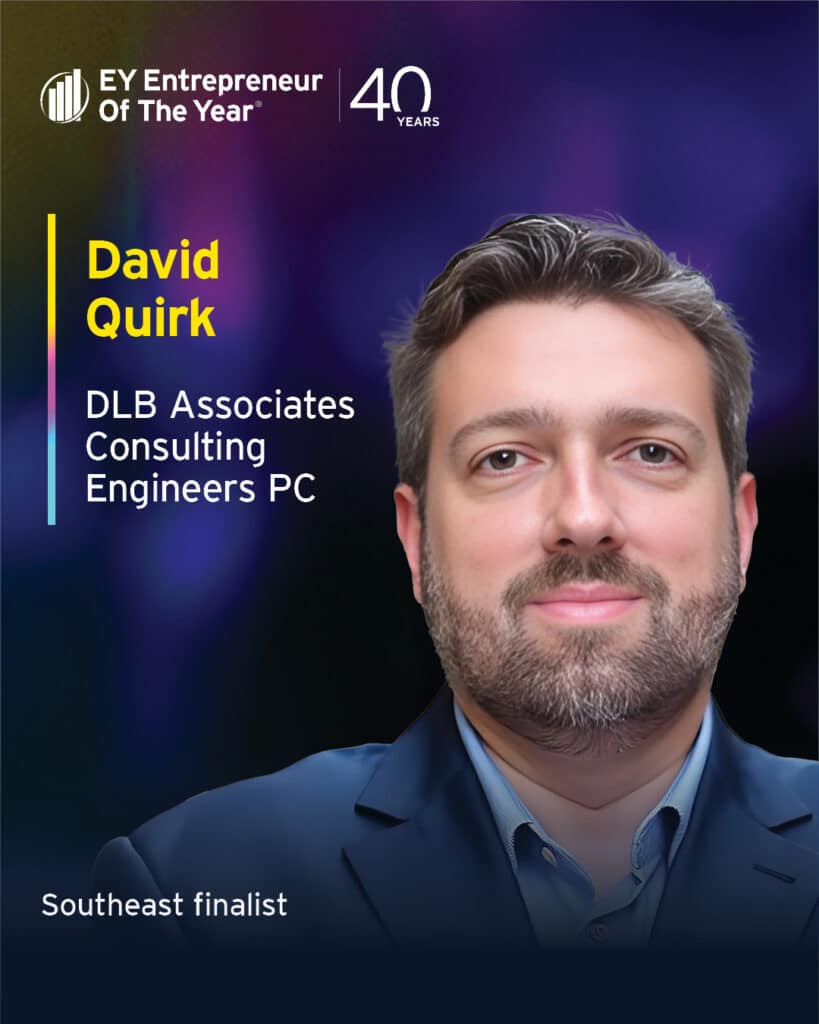
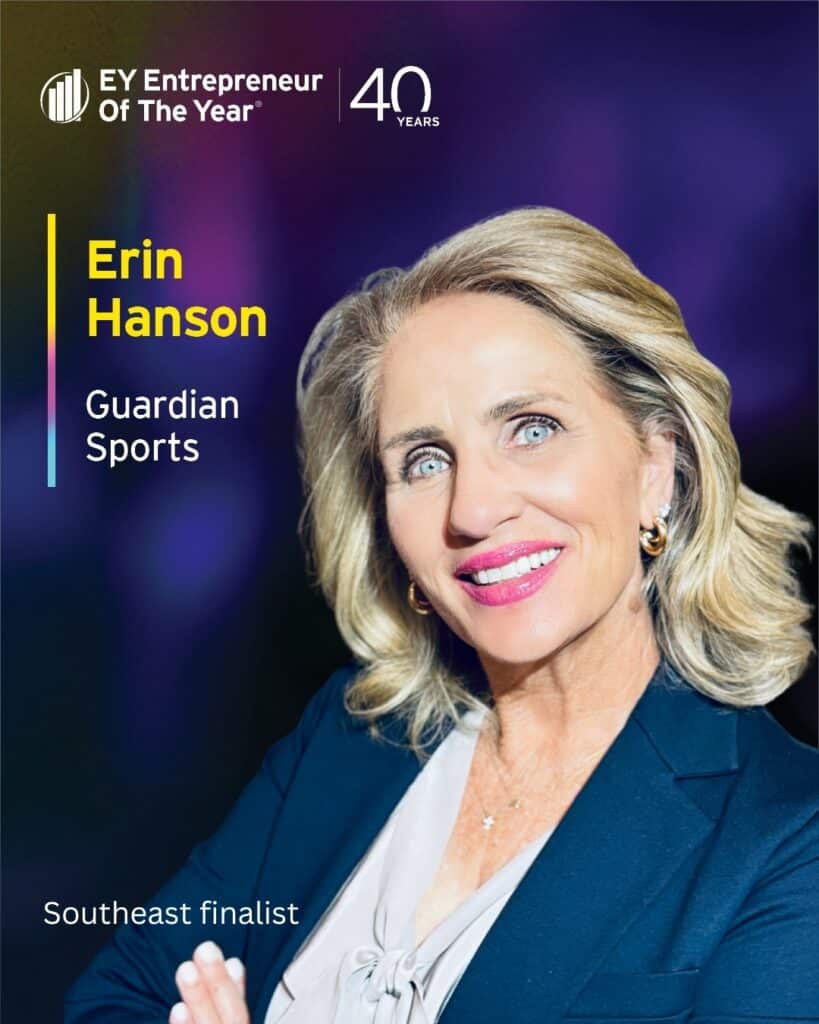
“This year’s finalists are leading examples of innovation, perseverance and resilience, illuminating paths to a brighter future for their industries and communities,” said Chevy Arnold, Entrepreneur Of The Year Southeast Program co-director.
“Their commitment to excellence transforms challenges into opportunities, inspiring us all,” added Kimberly Kicklighter, Entrepreneur Of The Year Southeast Program co-director.
Entrepreneur Of The Year honors many different types of business leaders for their ingenuity, courage and entrepreneurial spirit.
The program showcases original founders who bootstrapped their business from inception or who raised outside capital to grow their company; transformational CEOs who infused innovation into an existing organization to catapult its trajectory; and multigenerational family business leaders who reimagined a legacy business model to strengthen it for the future.
Including Quirk and Hanson, the 2025 Southeast finalists are:
- Marc Hodulich | 29029 | Atlanta, Georgia
- Damon Stafford | Alpine Intel | Charlotte, North Carolina
- Lou Hensley | Aspida | Durham, North Carolina
- Matthew Dent | Buffalo Rock Company | Birmingham, Alabama
- Melanie Little | Colonial Pipeline Company | Alpharetta, Georgia
- Will Bartholomew | D1 Training | Franklin, Tennessee
- Rene Diaz | Diaz Foods | Atlanta, Georgia
- David Quirk | DLB Associates Consulting Engineers PC | Peachtree Corners, Georgia
- Markus Scott | EyeQ Monitoring | Atlanta, Georgia
- Jon Gosier | FilmHedge | Atlanta, Georgia
- John Fitzpatrick | Force Marketing | Atlanta, Georgia
- Dr. Barry Patel | Galt Companies | Atlanta, Georgia
- Dr. Wade Smith | Galt Companies | Atlanta, Georgia
- Charles Gillespie | Gambling.com Group | Charlotte, North Carolina
- Kevin McCrystle | Gambling.com Group | Charlotte, North Carolina
- Mike Griffin | Griffin Brothers Companies | Cornelius, North Carolina
- Erin Hanson | Guardian Sports | Peachtree Corners, Georgia
- Dan Beem | Hissho Sushi | Charlotte, North Carolina
- Aaron Siegel | Home Team BBQ | Charleston, South Carolina
- Marc Murphy | Ignite Digital Services | Charleston, South Carolina
- Miller Chalk | Inglett & Stubbs, LLC | Mableton, Georgia
- Liza Rodewald | Instant Teams | Southern Pines, North Carolina
- Stephen Andresen | McClancy Foods & Flavors | Fort Mill, South Carolina
- Travis LeFever | Mission Mobile Medical Group | Greensboro, North Carolina
- Cyrus Mojdehi | Northway Homes | Charlotte, North Carolina
- Connor Ryan | NutraSky | Alpharetta, Georgia
- Fritz Owens | OTR Solutions | Roswell, Georgia
- Christopher Chuang | Relay, Inc. | Raleigh, North Carolina
- Kurt Jacobus | restor3d, Inc. | Durham, North Carolina
- Tom Kendrot | Shearwater Health | Nashville, Tennessee
- Teak Shore | Southern Lighting Source | Cumberland, Georgia
- Cindy Eckert | Sprout Pharmaceuticals | Raleigh, North Carolina
- Bryan Moore | TalkShopLive Inc. | Nashville, Tennessee
- Tina Moore | TalkShopLive Inc. | Nashville, Tennessee
- Igor Marinelli | Tractian | Atlanta, Georgia
- Joan Butters | Xsolis | Franklin, Tennessee
You can learn more about the finalists at ey.com/en_us/entrepreneur-of-the-year-us/southeast/winners-finalists.
Regional award winners will be announced on June 25 during a special celebration. The winners will then be considered by the national independent panel of judges for the Entrepreneur Of The Year National Awards, which will be presented in November at the annual Strategic Growth Forum®, one of the nation’s most prestigious gatherings of high-growth, market-leading companies.
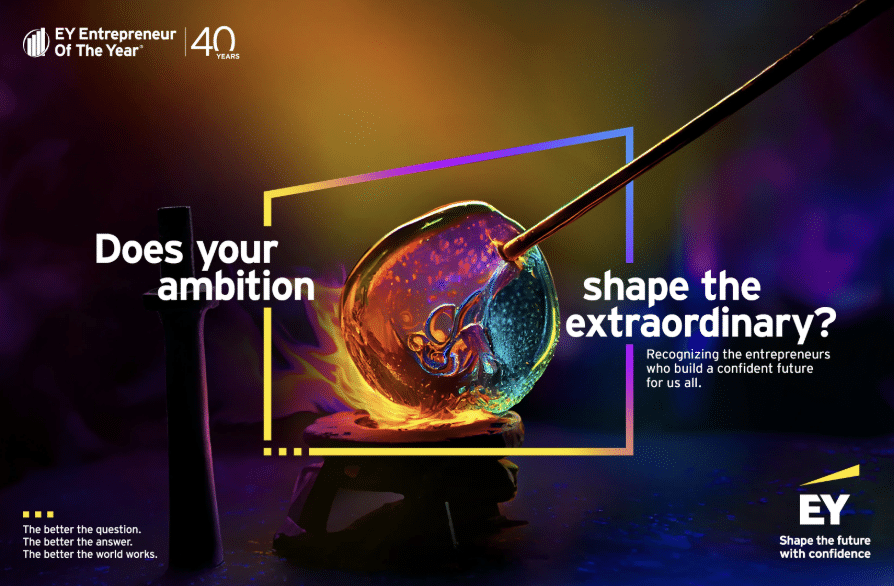
About Entrepreneur Of The Year
Founded in 1986, Entrepreneur Of The Year has celebrated more than 11,000 ambitious visionaries who are leading successful, dynamic businesses in the U.S., and it has since expanded to nearly 60 countries globally.
The U.S. program consists of 17 regional programs whose panels of independent judges select the regional award winners every June. Those winners compete for national recognition at the Strategic Growth Forum® in November where national finalists and award winners are announced.
The overall national winner represents the U.S. at the EY World Entrepreneur Of The Year™ competition.
For more about the award, visit ey.com/us/eoy.
Related
Business
SCB Construction Group Partners with CGA Reps on New Peachtree Corners HQ
Published
4 weeks agoon
April 15, 2025
SCB Construction Group, freshly rebranded from SteelCo, secures construction project with CGA Reps for new office HQ in Peachtree Corners
SCB Construction Group has announced a strategic partnership with CGA Reps to build a new office headquarters in Peachtree Corners. The project, encompassing approximately 26,000 square feet of innovative workspace, marks a significant milestone in advancing CGA Reps’ corporate vision while showcasing SBA Construction Group’s commitment to delivering transformative construction solutions.
In collaboration with Oakley Real Estate Partners — serving as developers of the project on behalf of CGA Reps — this venture reflects a united effort to bring cutting-edge design (from Smallwood architecture firm) and operational excellence to the commercial kitchen equipment industry.
The announcement follows several high-profile projects for SCB Construction Group in 2024, including a 72,500-square-foot manufacturing center and headquarters for Process Equipment & Controls, an impressive interior build-out for Courtesy Ford Conyers’ commercial service center and the Phase 1 completion for StoreEase Loganville — recently honored as a 2024 Smart Facility of the Year by Modern Storage Media.
A bold new chapter for CGA Reps
The new 25,890-square-foot headquarters is designed to be more than just a workplace — it is envisioned as an inspiring environment that serves both client engagements and employee creativity. CGA Reps is recognized as an industry expert in commercial kitchen equipment, representing leading manufacturers, warehousing, distributing and installing everything from fryers to commercial walk-in freezers.
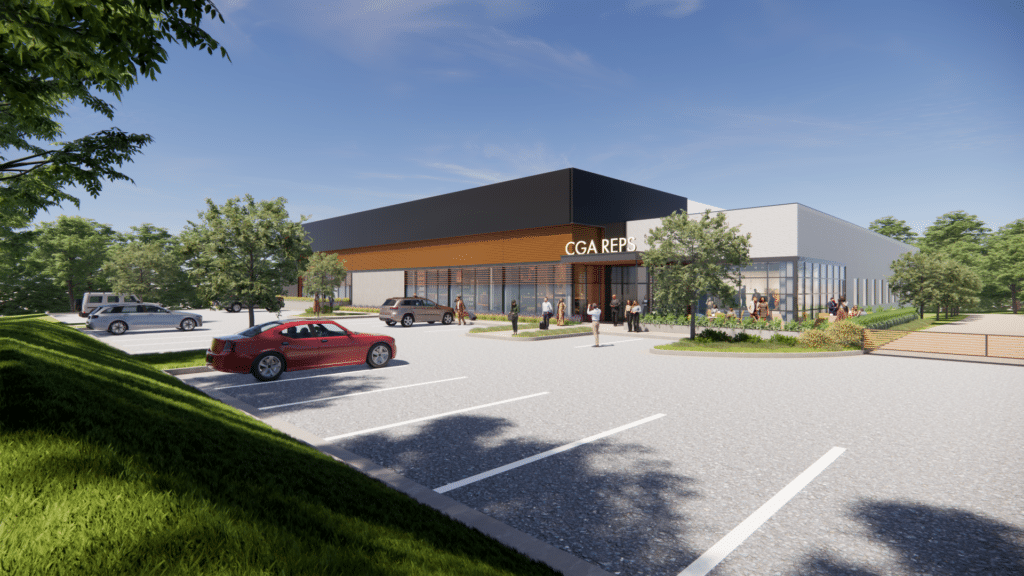
The facility’s design reflects this expertise, featuring a dedicated approximately 9,000-square-foot showroom kitchen that will host equipment demonstrations, tradeshows and webinars. This dynamic space will allow CGA Reps to showcase its comprehensive product range and provide clients with hands-on experiences of the latest commercial kitchen innovations.
A standout feature of the project is its innovative approach to stormwater management. With the site comprising only three acres, sufficient space for a traditional detention pond does not exist. To overcome this challenge, the design includes an underground detention system located beneath the truck court to efficiently handle all stormwater runoff.
This solution not only maximizes the use of the available land but also reinforces CGA Reps’ commitment to sustainable practices.
“We are excited to embark on this project with CGA Reps,” said Jay Bailey, CEO of SCB Construction Group. “This partnership underscores our commitment to customer excellence in design and construction, and it is a testament to the trust our clients place in our ability to deliver projects that not only meet but exceed expectations.”
Delivering excellence through proven expertise
SCB Construction Group’s track record in 2024 has been nothing short of remarkable. Earlier in the year, the company completed a 72,500 square foot manufacturing center for Process Equipment & Controls, integrating office space within a dynamic production facility.
This project was celebrated for its innovative design that balanced operational efficiency with a modern aesthetic, utilizing IMP panels to mimic tilt-up concrete, setting new standards for manufacturing environments.
Similarly, the interior build-out for Courtesy Ford Conyers’ commercial service center demonstrated SCB Construction Group’s ability to transform conventional spaces into functional and attractive environments that cater to both customer and staff needs.
The company’s commitment to quality and precision was again evident in the successful Phase 1 completion for StoreEase Loganville. This project, which recently earned the distinction of a 2024 Smart Facility of the Year by Modern Storage Media, highlights SCB Construction Group’s forward-thinking approach to construction and design, incorporating smart technologies and design that enhance sustainability and operational efficiency.
A rebranding that reflects a vision for the future
In a move that signals its evolution and growth, SCB Construction Group has recently rebranded from its former identity, SteelCo Buildings, as it spins off its construction division. This strategic rebranding is not merely cosmetic — it represents a renewed commitment to capabilities, credibility and client-focused service.
The refreshed brand is anchored by a new tagline “Deep Expertise, High Expectations” and a clear brand promise that communicates the company’s mission: to craft exceptional construction experiences based on precision, innovation and trust.
“Our rebranding is about more than just a new name or logo; it’s a renewed promise to our clients and communities,” explained Robert Lee, marketing director at SCB Construction Group. “We believe that our updated brand identity, including our invigorated tagline and mission statement, encapsulates our dedication to pushing the boundaries of design and construction. It reflects our commitment to creating spaces that are as inspiring as they are functional.”
Transforming spaces to inspire and connect
The new headquarters for CGA Reps is expected to become a landmark facility in Peachtree Corners. Beyond its impressive architectural design and advanced construction techniques, the building is planned as a hub for innovation and collaboration.
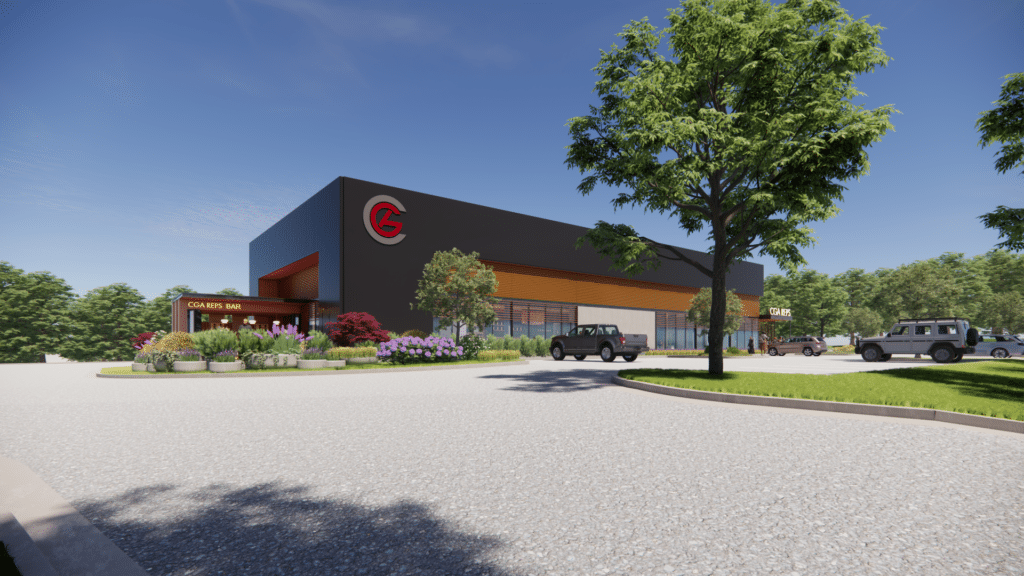
The interior build-out will include dynamic client reception areas, interactive meeting rooms, and dedicated spaces designed to foster creativity and teamwork among employees. The layout is crafted to ensure that every area of the facility contributes to a productive and inspiring work environment.
“By investing in this state-of-the-art facility, CGA Reps is making a strong statement about the future of work,” said Bryan Young, VP of construction at SCB Construction Group. “Our team is dedicated to designing and building spaces that not only serve the immediate needs of our clients but also create environments that motivate and inspire. The new headquarters will be a testament to that vision.”
Looking ahead
The partnership between SCB Construction Group and CGA Reps marks a significant step forward for both companies. As SCB Construction Group continues to build on its legacy of excellence and innovation, this project is poised to set a new benchmark for modern office headquarters design in the region.
With a strategic focus on creating spaces that inspire, connect and drive success, the future looks promising for both SCB Construction Group and its esteemed partner, CGA Reps.
For more information on the new headquarters project or to learn more about SCB Construction Group’s portfolio, visit scbcg.com.
Related
Read the Digital Edition
Subscribe
Keep Up With Peachtree Corners News
Join our mailing list to receive the latest news and updates from our team.
You have Successfully Subscribed!

Digital Edition

Official City Merchandise Line Debuts This Saturday at Town Green

Paul Duke STEM High School Student Earns CGO Scholarship

World Blood Donor Day Starts Here: Theo’s Miracle, Katherine’s Mission [Podcast]

Executive Function: A Tribute to Working Moms

Peachtree Corners Grows Business Opportunities Through Economic Development

Simpson Elementary Marks Exceptional Children’s Week

Peachtree Corners Hosts Discussion About the Future of Local Policing

Atlanta’s Dog Howl-O-Ween Festival Moving to Peachtree Corners for 2025

D1 Training Brings New Fitness Concept to Peachtree Corners

Peachtree Corners Hosts Discussion About the Future of Local Policing

City of Peachtree Corners Awarded Certificate of Achievement From GFOA for Seventh Straight Year

Simpson Elementary Marks Exceptional Children’s Week

Executive Function: A Tribute to Working Moms

Official City Merchandise Line Debuts This Saturday at Town Green

Peachtree Corners Grows Business Opportunities Through Economic Development

Light up the Corners [Video]

Capitalist Sage: Business Leadership in Your Community [Podcast]

Cliff Bramble: A Culinary Adventure through Italy

Top 10 Brunch Places in Gwinnett County

A Hunger for Hospitality

THE CORNERS EPISODE 3 – BLAXICAN PART 1

Top 10 Indoor Things To Do This Winter

The ED Hour: What it takes to Remove Barriers from Education







